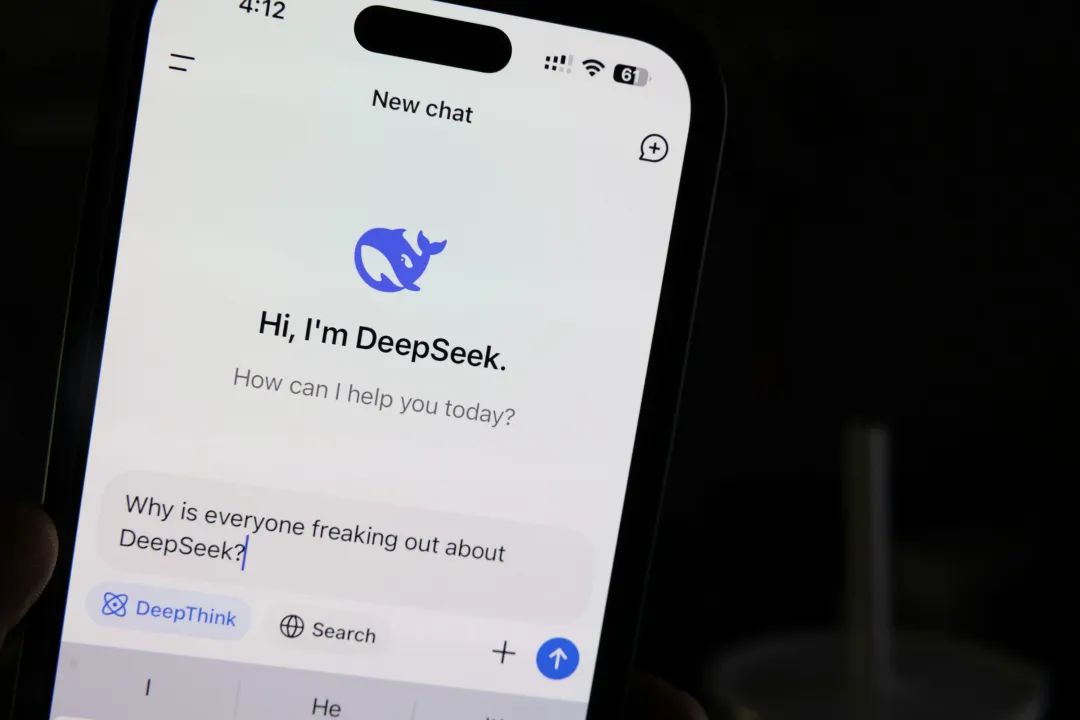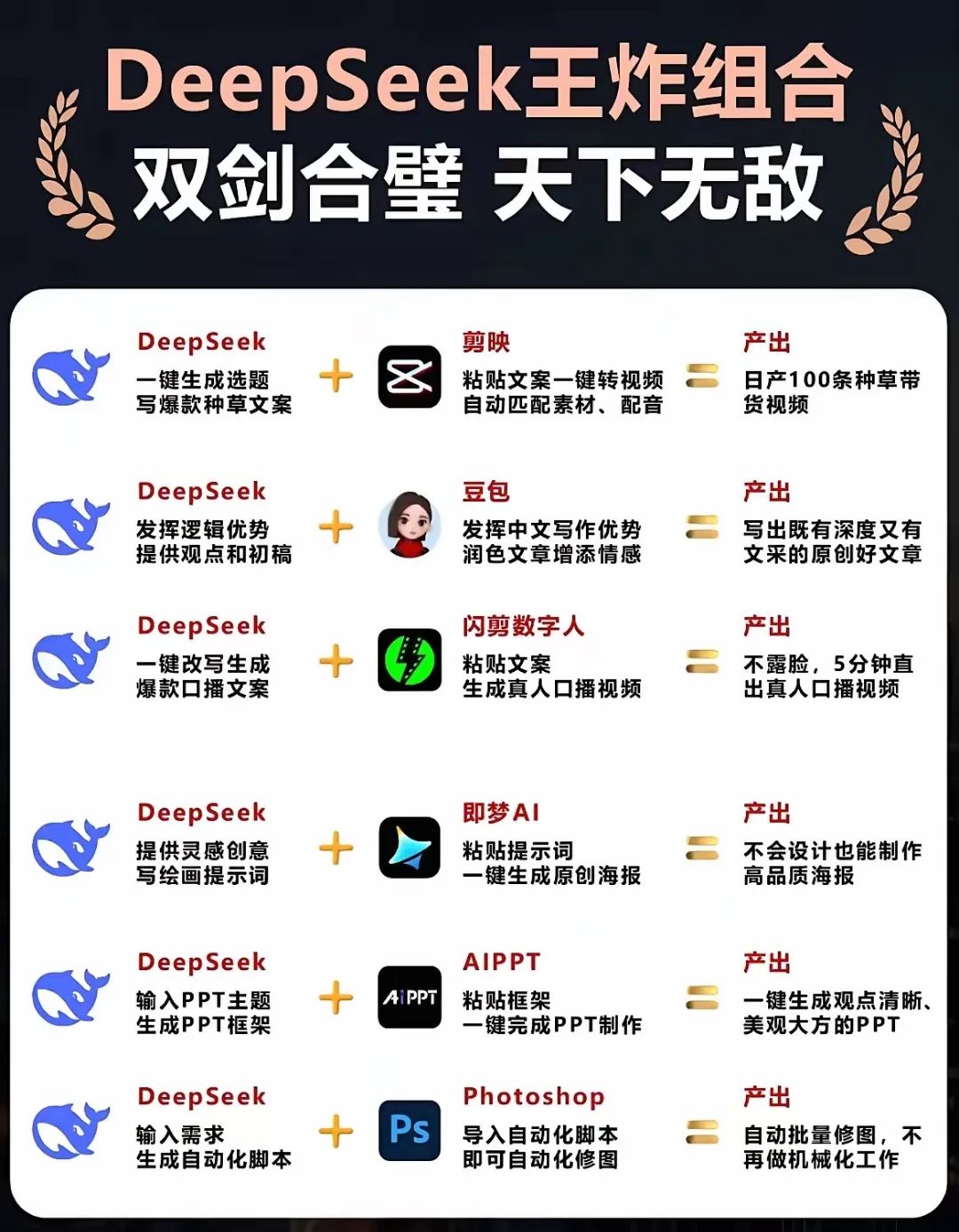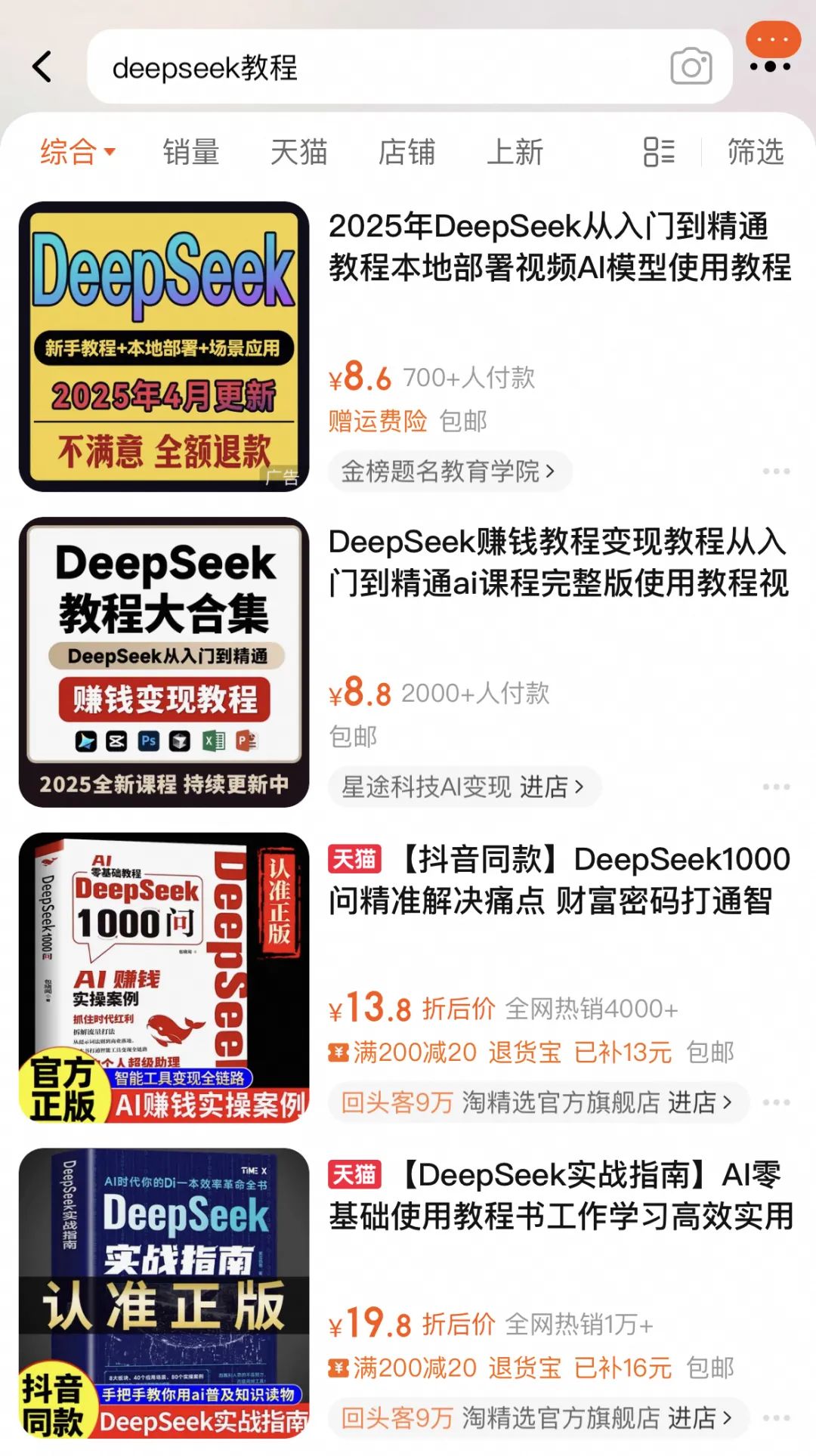DeepSeek's Three-Month Surge: Where Are the Early Money-Makers Now?
![]() 04/23 2025
04/23 2025
![]() 729
729

The assertion that "it's not AI that will eliminate humans in 2025, but those who can use AI will eliminate those who can't" is merely an anxiety-driven sales pitch. One doesn't need to deeply understand AI to profit from it.
Cover source: Unsplash
If you managed to steer clear of ChatGPT in 2023 and Sora in 2024, chances are, in 2025, you'll find yourself a potential audience of DeepSeek, ensnared in its intricate web.
Zhang Lei vividly recalls a late January morning when she woke up to find her Xiaohongshu (a social media platform) feed flooded with DeepSeek and its iconic blue icon. From octogenarians to elementary school kids, everyone seemed to have memorized the beginner's tutorial for DeepSeek, as if mastery of the tool was the latest entry ticket to the digital world.
Various accounts followed suit. Sellers would disable online search functions, input prepared selling points into DeepSeek, and pose questions like "Recommend a XXX for me" to let AI sell their products. Emotional bloggers would ask DeepSeek how to choose a high-quality man over 25 and then pitch their own psychological healing courses. Even the parenting sector got in on the action, using DeepSeek to teach kids or manage their schedules.
DeepSeek is versatile, adaptable to various contexts. Zhang Lei noticed that recently, in the realm of the internet, DeepSeek has become akin to "Internet+" in viral posts—something that can be applied to anything, truly embodying the idea that "the highest goodness is like water, yielding to any shape it is poured into." In this reality show, no one loses; DeepSeek garners attention, while bloggers and brands share the spoils, all enjoying the ride.
But an even more advanced "traffic password" is teaching others how to use DeepSeek. A new type of blogger has emerged, not directly selling products or taking ads, but posing as a digital savior, selling DeepSeek courses on how to ask questions, write prompts, and make money with the tool—for instance, by producing copywriting, scripts, notes, and short video scripts.
For example, a blogger Zhang Lei recently followed taught everyone how to use DeepSeek for three side hustles. The video began with a sense of urgency, exclaiming, "Sisters who still can't use DeepSeek now deserve to not make money," and then elaborated on how low the threshold for DeepSeek is, how easy it is to write popular copywriting, and how ideal it is for self-media now.
But the more she watched, the more she felt something was amiss. Wasn't this video script also written by DeepSeek? Scrolling down, she found the video had barely surpassed 200 likes, and the blogger had posted over 30 videos on using AI, yet their fan base hadn't even reached 10,000. Wasn't this a modern-day case of "teaching the apprentice to starve the master"?
Zhang Lei knows well that not many internet entrepreneurs are willing to be the sacrificing farmer, awaiting the repetition of the "Farmer and the Snake" tale. In reality, these people are no different from trend-riders, making a quick buck by exploiting the first wave of information gaps. Once everyone knows about DeepSeek, they'll realize most people use it no differently from Baidu—casually searching for something when they need it and then forgetting about it.
But the nascent DeepSeek has a "crippling skill point": after three or four interactions, it often shows "server busy." So when uncertain, Zhang Lei again turned to Xiaohongshu and found many promoting a new type of DeepSeek that can be deployed locally, is full-featured, and doesn't limit the number of conversations.
After being coaxed into filling in the invitation code in the comment section, she realized she had become part of the bloggers' game—invitation codes earn commissions based on the number of fills, unknowingly aiding DeepSeek bloggers in their quest for riches.
1
Algorithmic Cage for Cyber Laborers
"Your account has been permanently banned." Many bloggers who use DeepSeek to mass-replicate popular video copywriting and produce scripts on an assembly line can probably only expect this outcome when they reach the end of their RPG game. Accounts using DeepSeek to mass-produce Chinese-style health videos will trigger the platform's review mechanism after exceeding 10,000 views.
In this nationwide AI gold rush, bloggers' experiences reveal the brutal truth of the traffic industry chain: it's never the tool users who get truly rich, but the merchants selling the gold panning shovels.
Bloggers generating batch videos haven't realized they've become digital laborers on the AI assembly line. Under AI teaching accounts' guidance, they first master practical tutorials: inputting health copywriting generated by DeepSeek into Jimeng AI, using templated instructions to mass-produce ink painting-style videos, and finalizing industrialized assembly with Jianying. This combination can achieve a staggering daily output of five updates. With luck, one video goes viral; with bad luck, hundreds are banned or de-weighted.
It's more like testing parameters than content creation. Their computers store hundreds of video drafts rejected by the platform for review, but each title, "golden 10-second opening," and tag accurately hits their sector's hot words.
For example, in the health sector, there are formula templates filled with "low-cost health," "replace life-shortening work with paid health," "workers don't go to the hospital," etc. The food sector has exaggerated phrases like "breakup meal," "restaurants you must visit even if the sky falls," "XX is so foolish for not promoting this," etc. Changing a word or location creates a new video.
Some bloggers say "DeepSeek has broken their cognition," no longer needing to struggle to think of hot topics. They just extract others' copywriting, let AI imitate the style, casually feed it viewpoint materials, and churn out dozens of pieces daily.

Beyond server busyness, DeepSeek likely starts to become "eternal" and "wrinkled" as it writes. Whether writing scripts or outputting answers, ancient backgrounds or mathematical problems, it always entangles with its cyber mechanics, losing the crucial "human touch." It's adept at packaging mediocre answers as high-end textbooks, but few actually buy into it.
So, when bloggers discover accounts with 100,000 followers raking in traffic with rougher content, they glimpse the traffic field's unwritten rules: cases claiming to "gain 100,000 followers with nine videos" are illusions created by DOU+ promotion and historical fan accumulation.
Bloggers transforming existing accounts with tens of thousands of followers into new fields find that no matter how much AI is used, it's ultimately just old data being rehashed. Showcase sales aren't even a fraction of what they were before the transformation. AI-mass-produced "Hour of the Pig Liver Nourishment" and "Chinese-style Health" videos may seem to hit national health anxiety, but they generate much invalid traffic—elderly users recommended by algorithms watch for free, while younger groups find the content outdated, hard to convert into purchasing power.
Take the Douyin account "Chinese Health Way" as an example. With 535,000 followers, its first video was posted on December 24 last year. But among the 162 updated works, there are no advertising businesses, and only 501 items have been sold in the shopping showcase. Even at a relatively high commission rate of 10 yuan per item, the total is just over 5,000 yuan.
"If it's not very profitable, why did this content suddenly become so popular? And why are those bloggers desperately promoting it?" In truth, the assertion that "it's not AI that will eliminate humans in 2025, but those who can use AI will eliminate those who can't" is just an anxiety-driven sales pitch. They don't need to deeply understand AI to profit from it.
AI itself probably didn't expect to become part of the bloggers' game.
2
The Gold Rush Named DeepSeek
When DeepSeek unexpectedly surged in popularity, a commercial storm fueled by technological fervor and wealth anxiety brewed on the internet.
This AI, dubbed the "Chinese version of ChatGPT," not only sparked a "transformation revolution" in technological applications but also unexpectedly activated the internet economy's most active "gold panning gene."
Amidst tech giants' model parameter battles, a hidden gold track was growing wildly—some were already frantically harvesting Chinese chives in the soil of knowledge payment.
This industry, which insiders joke is the "cognitive tax," never loses money in selling courses.
In 2023, Li Yizhou, boasting a Ph.D. from Tsinghua University, quickly achieved 50 million yuan in sales with "Everyone's AI Course: Zero-Based Introduction," becoming an instant legend. "Zhou Zuoluo" launched the "ChatGPT AI Monetization Circle" course on the knowledge payment APP "Zhishixingqiu," earning 2.79 million yuan in just 17 days.
Now, the basic course of "Super Traffic Marketing Course - IP+AI," ranking first in sales on the Douyin platform, is priced at 399 yuan, with sales reaching 78,000 units and revenue exceeding 30 million yuan. The position of AI lecturer with a monthly salary of 50,000 yuan on Boss Zhipin is still recruiting new members, offering one-on-one course services targeting specific sectors.
From 9.9-yuan crash courses on e-commerce platforms to short video myths of creating tens of millions in wealth, from "customized" private deployments to MCN agencies' AI content factories, the only constant is change.
Typing "DeepSeek tutorial" into the Taobao search bar instantly yields over 2,000 product links like a flood tide. For the price of a cup of bubble tea, you can achieve "knowledge payment," playing out an alternative narrative of technological democratization. All covers uniformly read "from beginner to proficient," many endorsed by universities with the label "Produced by Tsinghua, nanny tutorial," and some merchants promise "free updates with a one-time purchase."
Clicking into the Taobao comment section, many buyers have shared the Baidu Netdisk materials they received—the folder divided into four major sections: "DeepSeek from beginner to proficient pdf+video," "DeepSeek nanny-level beginner tutorial," "DeepSeek usage tips collection," "DeepSeek command collection (nanny-level feeding)," thoughtfully including "DeepSeek 7 scenarios + 50 cases + a full set of prompts, from beginner to proficient dry goods." This 16.4-yuan course has sold 200 copies in a month, and buyers only need to share the link to achieve "effortless earnings" of thousands of yuan.

There are also negative reviews, stating the "master DeepSeek in three days" course framework is a reskinned ChatGPT course template from a few years ago—simply replacing English prompts with Chinese and changing the OpenAI interface tutorial to a domestic API access guide, continuing to harvest cognitive tax in the wave of technological iteration. More astute players package localized deployment solutions into a 199-yuan "one-on-one package," quietly transitioning from information traders to solution providers amidst tech newbies' vague longing for customized services.
There are also bloggers promoting the ability to make money from stock trading with DeepSeek. By connecting stock trading software to DeepSeek, you can control the computer to automatically analyze stocks. The live broadcast room also has a tutorial and software purchase link attached below.
In this nationwide AI gold rush, the technology itself has retreated to the background. While a certain technology forum debates model parameters, early morning market vendors in streets and alleys already discuss using AI to write promotional copywriting.
The more user-friendly the technology, the greater the need for a huge intermediate service layer to bridge the cognitive gap. Just like the California gold rush in the 19th century gave birth to Levi's jeans legend, today's DeepSeek-sparked AI wave is also mass-producing new-era "information gap merchants."
But selling to individual businesses alone can no longer satisfy merchants' ambitions. Small and medium-sized enterprises also eagerly want to use AI to enhance their digital wave competitiveness but are deterred by the technical threshold. Some specifically undertake AI agency operations, AI solutions, and other businesses on platforms like Zhu Bajie and Taobao. They're proficient in using DeepSeek to write marketing copywriting for clients, conduct competitive analysis, and generate professional reports.
From promotional copywriting for hot pot restaurants to customer management solutions for beauty salons, it comprises an extensive "anxiety solution library" that blankets the real economy. When a sports shoe brand owner orders a competitive analysis report, the store merely needs to swap out the brand name in the "Sports Shoe Category Template.xlsx" to generate a bespoke document worth 500 yuan in just 10 minutes.
In this industrialized production setup, the true gem isn't AI technology but the meticulously crafted arbitrage model. As business volume surges, operators initiate the second phase of their monetization plan. They recruit college students as part-time workers on campuses, training liberal arts majors to become digital assembly line operatives.
The third phase involves launching "AI private coaching courses" priced at 1980 yuan. These recorded course videos can be sold indefinitely, realizing knowledge monetization. If just 100 copies of these private coaching courses are sold, it directly generates 200,000 yuan in revenue.
3
The Era of Selling AI Courses Nationwide
"Last 3 spots! AI courses originally priced at 1999 yuan are now limited-time at 99 yuan!" As such slogans bombard live broadcasts, a precise harvesting aimed at those anxious about acquiring knowledge has commenced. In this traffic game, AI course sellers have constructed an interconnected monetization system that transforms ordinary people's thirst for knowledge into real money and substantial profits.
The first sales blogger tactic is persona packaging. Whether a self-media account thrives or falters, frankly, it hinges on whether fans trust you. Hence, a compelling persona can propel a blogger to 99% success. This is the cornerstone of their triumph and an unspoken industry norm they never vocalize.
As evident on BOSS Zhipin, on the AI lecturer recruitment page, "responsible for course conversion rates" is listed as a priority, while actual AI expertise is deemed optional. One educational institution offers a job with a 35,000-yuan monthly salary, requiring only candidates with live sales experience and traffic sensitivity.
This hiring logic has spawned mass-produced "AI authorities": after Li Yizhou's "Tsinghua Ph.D." persona was debunked by the school, imitators still use the "Intelligent Body Development Certificate" swiftly obtained from ChatGPT as professional validation. Lecturers adeptly utilize virtual backgrounds, academic jargon, and dramatic rhetoric to transform from laypersons to experts in a 30-second short video.

When sales of hundred-yuan courses stagnated, Li Yizhou reduced the entry-level course to 49 yuan, and sales soared past 5,000 copies in a single month. This seemingly unprofitable customer attraction strategy was actually a means to sieve out high-net-worth users.
Students who purchase low-priced courses are immediately added to the "AI Wealth Creation Group," where teaching assistants incessantly promote success stories of students enrolled in the 3,980 yuan private coaching course. A bot in the group automatically sends hourly countdowns for limited-time discounts. Some students have realized that most of the time in the 399 yuan "AI Traffic Password" course they bought is spent promoting ten-thousand-yuan VIP services, creating a consumption trap where "buying the course means falling into a pitfall".
The fearmongering of "not learning AI will lead to obsolescence" coupled with the golden promise of "guaranteed income from order-taking platforms" forms a seamless closed loop for monetizing anxiety. Ultimately, few students become bloggers, but there's a surge in demand for PPT beautification services at 15 yuan per order. Savvier players collude with job recruitment platforms to package free resume modification services as "AI job internal recommendation qualifications," leveraging BOSS Zhipin's traffic interface to complete the final link in the monetization chain.
In this nationwide AI frenzy, ordinary people can safeguard only two things: their tightly clutched wallets and a clear understanding. Believe that this is an era where everyone can utilize DeepSeek a few times, but not everyone can successfully transition into a monetizing blogger in the latter half of the self-media era. In the vast assembly line of video tracks, relying on quality is invariably more credible than relying on quantity.
The first wave of individuals aiming to get rich through DeepSeek were akin to playing a colossal game of Monopoly, stopping and starting, buying houses in the hope of collecting audience tolls. However, in a moment of inattention, their houses were seized, and all the money in their accounts ended up in the hands of course sellers. In the final tally, those who laugh last never produce videos; they are mere distributors of video courses.







